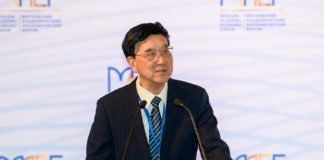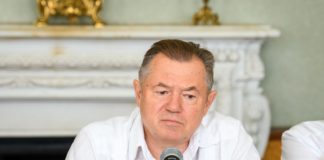The fact that Russia and Turkey are important economic partners is obvious for any Russian tourist or buyer of consumer goods. Now the symbols of bilateral relations became more serious than tourism and things and those are the Akkuyu nuclear power plant and the Turkish Stream. And in recent years, trade, cargo transportation and even finance. In 2022, the volume of mutual trade doubled, exceeding $62 billion. The 30-year history of relations between the new Russia and the Black Sea neighbor was not easy, but partners always managed to overcome crises. And now, given the sanctions problems of Russia and the difficult situation in the Turkish economy, countries can benefit from the development of high-tech trade ties.
Dashing 90s
In May 1992, Moscow and Ankara signed a fundamental bilateral treaty, which emphasized that Russia and Turkey consider each other friendly states and undertake to cooperate on the basis of good neighborliness. In those years, friendship began to boil, especially in Istanbul and other small wholesale bases and Russian clothing markets.
Despite the fact that there were quite a few contradictions, the countries managed to find common ground and this was largely helped by the economy, in particular, the approval by Russian Prime Minister Viktor Chernomyrdin and his Turkish counterpart Bulent Ecevit of the construction of the Blue Stream gas pipeline, which played a large role in the development of relations.
The era of Putin and Erdogan
In the 2000s, with the onset of the “Putin and Erdogan era” (as some analysts unofficially called these years), relations between the two countries began to develop rapidly. One of the reasons was the similarity of geopolitical and economic trajectories. Both countries have begun to be more cautious about cooperation with the West. If the first president of Russia never visited Turkey, then Vladimir Putin made five visits in the first decade of the 21st century. In 2009, in the Kremlin, the leaders of the two countries signed a declaration on deepening friendship and partnership. The document noted the mutual desire to ensure peace and stability in the Eurasian space and in the world as a whole.
In 2001 the total trade turnover amounted to $4 billion, in 2005 it reached $15 billion, and in 2013 it exceeded $33 billion. In 2005, the Blue Stream gas pipeline was officially opened. “Nothing like this has happened before. Specialists of the largest energy companies participated in the creation of the pipeline. The resources and intellectual capital of Russia, Turkey and other countries were successfully combined here,” Vladimir Putin said at the time.
In 2010, the parties agreed on another «project of the century» — the construction by Rosatom of the Akkuyu nuclear power plant in southern Turkey. It was planned to build four power units, the total investment was estimated at $22 billion. Experts emphasized that the nuclear power plant would cover 10% of the republic’s electricity needs.
In 2010, a visa-free regime was also agreed for up to 30 days. Later, Turkey unilaterally extended the visa-free stay of Russians on its territory to 60 days. This was one of the reasons for the increase in tourist traffic. In 2006, 1.8 million Russians visited Turkey, in 2013 their number increased to 4.2 million people. “We are pleased that the Russians treat our country with sympathy. Turkey has become a second home for many,” Turkish Tourism Minister Omer Celik said at the time.
Crisis and new rapprochement
Events in Syria had a negative impact on economic relations, but growth quickly recovered. In 2017, the trade turnover between Russia and Turkey reached $22 billion, in 2021 it exceeded $33 billion. New records were set by the tourist flow. So, in the pre-Covid year of 2019, 7 million Russians visited Turkey, the country became the most popular outbound destination for Russians, in Turkey, citizens of the Russian Federation outstripped the Germans and became leaders in the number of tourists from other countries.
In the geopolitical and economic field, Russia and Turkey participated together in the Syrian settlement within the framework of the Astana format, created a joint monitoring center that collects, summarizes and verifies information on compliance with the agreements between Armenia and Azerbaijan.
The countries built the Turkish Stream gas pipeline in a record two years. The laying of the pipe allowed Russia to diversify transit and gain new markets. Ankara not only strengthened its own energy security, but also became a gas hub for the countries of southern and southeastern Europe.
Under sanctions
In 2022, Turkey not only did not impose sanctions against Russia, but retained air traffic, engaged in the re-export of Western products and became one of the guarantors of the “grain deal” on the export of grain from the Black Sea ports, which was terminated in July 2023 due to the actions of Western partners. All this made it possible to double the trade turnover in one year, by the end of 2022 the volume of mutual trade exceeded $62 billion. Turkey exports fruits, vegetables, light industry products, household chemicals, automotive parts, and some types of electronics. Russia supplies gas, oil and oil products, coal, at the same time, the growth of “non-primary” exports increased by 19%.
Large infrastructure projects have not stopped either. The construction of the first power unit of the Akkuyu NPP should be completed by the end of 2023. Russia also proposed to create a gas hub in Turkey by the end of 2023. Moscow will thus be able to supply foreign markets with the fuel that used to go to Europe through the Nord Streams, and Turkey will become a gas distribution center, further strengthening its foreign economic position.
Turkologist Yashar Niyazbayev, in an interview with The Free Economy Magazine, notes that the economy will continue to be a locomotive in the development of relations between the two countries.
— Moscow understands that Turkey is a member of NATO, Ankara has never been considered some kind of unambiguous ally. At the same time, the Kremlin appreciates the negotiability of Erdogan and his team, the sovereign position on a number of issues. I think the relationship will continue to develop. Still, they mean a lot to both Moscow and Ankara. The locomotive in this matter, in many respects, is the economy. The benefits of mutual friendship for both countries are enormous, the expert says.
Sergei Balmasov, a researcher at the Middle East Institute, says the two countries have already become such important political and economic partners for each other that hardly anyone can sacrifice them.
— Russia appreciates that Ankara adheres to the Montreux Convention, and has not opened the Black Sea straits for Western fleets. Last year, Turkey also became Russia’s second trading partner (after China). For Turkey, Russia has become the most important supplier of energy resources and a huge sales market, and the flow of Russian tourists still plays an important role, he emphasizes.
Turkey’s Economy and Russia’s Opportunities
Today, the Turkish economy is in difficult conditions of hyperinflation, depreciation of the lira and a foreign trade deficit balance. From 2018 to 2023, the value of the Turkish lira against the dollar lost more than 80%, and inflation in 2022 was 64.2%. Nevertheless, in 2022, Russian exports to Turkey increased by 128%, and reverse imports — three times less.
According to the general director of the Russian-Turkish Trade Partnership (RTTP), which he shared on the website of the Russian International Affairs Council, Russian companies need to pay more attention to imports. In particular, mechanical engineering occupies a leading place in the Turkish economy. In 2021, exports in engineering amounted to $23 billion (10% of the total).
At the same time, Turkey acts as a manufacturing hub for international companies and has the ability to import many important technological resources from developed countries such as Germany, the United States, England, Italy, China, Japan and South Korea. Mechanical engineering in Turkey focuses on Industry 4.0, there are state programs to support R&D, industrial zones are being created with ready-made infrastructure and social facilities for the implementation of industrial projects. At the same time, Turkey exports its products to the US and EU countries, successfully competing with well-known international brands. Strong positions are occupied by Turkish manufacturers of agricultural machinery, construction and mining equipment, packaging equipment, heating, ventilation and air conditioning systems, elevator, textile and medical equipment, auto parts.
Thus, Russian business has ready-made capacities at hand that can be used for outsourcing and creating, at a minimum, a temporary base for import-substitution projects. Naturally, the potential for parallel imports is still high. But in a strategic perspective, high-quality technological cooperation is much more important.
Educational cooperation
Turkey will cooperate with Russia in the field of education and dialogue on this topic will continue, Yusuf Tekin, the new Minister of National Education, said in July. “Turkey is well aware that Russia has a very high level of education. Therefore, we plan to cooperate with Russian colleagues. I was appointed head of the department relatively recently, but I am sure that the Russian-Turkish dialogue on this topic will certainly continue,” Tekin said (quoted by RIA Novosti). In order for the development of human capital to be mutually beneficial, Turkey specifically stops issuing residence permits to Russians, but this will not affect students, professionals and entrepreneurs.
Author: Igor Karmazin



